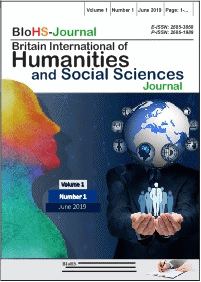Deficiencies among French Learners in Primary, Secondary, and High Schools in the Analamanga Region - Antananarivo, Madagascar
Abstract
The present study highlights French language acquisition in primary, secondary, and public high schools in Antananarivo and its surrounding areas. Classroom observations and surveys were conducted in two public primary schools (EPP 67 ha Nord-Est and EPP Antanimena Est), two General Education Colleges (CEG Betsimitatatra and CEG Antanimena), and three public high schools (Lycée Moderne Ampefiloha, Lycée Analamahitsy, and Lycée Ivato). Field research reveals factors contributing to students' language deficits: lack of exposure, with 60.41% of students using French exclusively in school and during French classes. This leads to language deficiencies stemming from limited practice and vocabulary, observed in 43.13% of students, indicating incomplete mastery of the French language. Consequently, the majority (42.40%) resort to using dictionaries due to this vocabulary gap. Analysis of learning methods shows that most students encounter challenges across all subjects (78%), with a preference for memorization as the primary strategy (63.33%). Additionally, the majority believes that the use of visual aids is the most effective method to address their shortcomings (71.81%). Therefore, this study focuses on observing French language learning methods and aims to enhance them for more satisfactory outcomes.
Downloads
References
Afkhaminia, M., & Nassirzadeh, V. (2022). Facteurs affectant l’apprentissage de la grammaire. French Linguistics, 3(5). https://doi.org/10.22054/rlf.2022.68851.1146
Alfotais, A. (2019). Investigating the effect of spaced versus massed practice on vocabulary retention in the EFL classroom [Phd, University of Essex]. https://repository.essex.ac.uk/25062/
Allam-Iddou, S. (2015). De l’usage des textes littéraires comme outil didactique pour l’enseignement/apprentissage du Français Langue étrangère. Synergies Chili, 11, 96-103. https://gerflint.fr/Base/Chili11/allam-iddou.pdf
Andrianjary, M. (2023). Factors Influencing English Language Learning in the Rural Malagasy Context: A Case Study of the Ambohidratrimo and Atsimondrano Districts. Matodang Journal, 2 (2), 70-83. https://www.biarjournal.com/index.php/matondang/article/view/903
Chamot, A. U. (2005). Language Learning Strategy Instruction : Current Issues And Research. Annual Review of Applied Linguistics, 25, 112‑130. https://doi.org/10.1017/S0267190505000061
Chergui, I., Benferhat, M., & Derrardjan R. (2023). L’apport des activités ludiques dans l’enseignement / apprentissage de la grammaire dans les cours du FLE. Cas de première année moyenne. [Mémoire de Master, UNIVERSITE MOHAMED El-BACHIR El-IBRAHIMI].
Cuq, J-P. (2003). Dictionnaire de didactique du français langue étrangère et seconde. Asdifle
Larsen-Freeman, D. (2012). On the roles of repetition in language teaching and learning. Applied Linguistics Review, 3(2), 195‑210. https://doi.org/10.1515/applirev-2012-0009
Gaudiaut, T. (2023). Infographie : La francophonie connaît une forte croissance dans le monde. Statista Daily Data. https://fr.statista.com/infographie/31460/francophonie-evolution-taille-population-comparaison-avec-espace-hispanophone-arabophone-lusophone
Giroux, L. (2016). La place et les rôles de la langue maternelle des apprenants en cours de langue étrangères. Synérgies France, 10, 55-68. https://gerflint.fr/Base/France10/numero_complet.pdf#page=57
Kromidha, E. (2015). Use of Information and Communication Technologies in Teaching French. Journal of Educational and Social Research, 5(1), 113-122. https://doi.org/10.5901/jesr.2015.v5n1p113
Lingani, O. (2019). Les situations scolaires de communication orale : l’enseignement-apprentissage du vocabulaire en contexte bilingue. Revue malienne de Langues et de Littératures, (004), 51-70. https://www.revues.ml/index.php/rmll/article/view/1529
MacIntyre, P.D. (1994). Toward a social psychological model of strategy use, Foreign Language Annals, 27(2), 185-195. https://www.academia.edu/5307242/Toward_a_social_psychological_model_of_strategy_use
Marcotte, S. (1993). Compte rendu de [Tardif, J. (1992). Pour un enseignement stratégique: l’apport de la psychologie cognitive. Montréal: Éditions Logiques.] Revue des sciences de l’éducation, 19(2), 421–422.
https://doi.org/10.7202/031636ar
Marcoux, R., & Wolff, A. (2019). La langue française dans le monde : Géographie et perspectives: Population & Avenir, (742), 4‑7. https://doi.org/10.3917/popav.742.0004
Matthey, M. (2021). Diglossie. Langage et société, Hors série(HS1), 111‑114. https://doi.org/10.3917/ls.hs01.0112
Meirieu, P. (2020). L’éducation et le rôle des enseignants à l’horizon 2020 http://www.meirieu.com/RAPPORTSINSTITUTIONNELS/UNESCO2020.pdf
Rafitoson, E. (1992). La diglossie: un métissage linguistique? L'exemple de la situation sociolinguistique à Madagascar. Dans J-C. Carpanin(éd.) Métissages, (211-220). L’harmattan.
Rakotomalala, J. R. (2016). Grammaire et acquisition d’une langue allogène à Madagascar. HAL- open science, 1-20. https://auf.hal.science/hal-01258770/
Randrianasolo, T. (2017). L’enseignement/apprentissage de l’écrit en français au lycée : le cas du résumé de texte [Mémoire de CAPEN, Ecole Normale Supérieure Université d’Antananarivo].
Rasoafara, L. (2017). La pratique de la traduction dans les lycées, état des lieux, le cas du Lycée Jean Joseph Rabearivelo et d’Anosizato [Mémoire de CAPEN, Ecole Normale Supérieure Université d’Antananarivo].
Razafindrabe, V. (2009). « Sketches » comme facilitateurs de l’apprentissage de l’anglais dans les classes d’orientation : cas du CEG Ambohimanambola [Mémoire de CAPEN, Ecole Normale Supérieure Université d’Antananarivo].
Redouane, R. (2020). Pour une intégration des activités ludiques dans l’enseignement/apprentissage du français en Algérie. Synergies Algérie, (28),59-74. https://gerflint.fr/Base/Algerie28/redouane.pdf
Rossiter, A. (2021). The Importance of Grammar. Institute of Education Sciences. ERIC Number: ED613321. https://eric.ed.gov/?id=ED613321
Sanchez Pérez, A. (2009). La enseñanza de idiomas en los últimos cien años: Métodos y enfoques,(Language Teaching in the Last Hundred Years: Methods and Approaches), (Première Edition), SGEL. https://dialnet.unirioja.es/servlet/libro?codigo=400248
Sayan, M. (2020). Le jeu pédagogique de construction pour favoriser le maintien des connaissances dans la mémoire à long terme. [Mémoire de Master 2, Institut national supérieur du professorat et de l’éducation Académie de Grenoble]. https://dumas.ccsd.cnrs.fr/dumas-03677987
Sauvé, L., Renaud, L., & Gauvin, M. (2007). Une analyse des écrits sur les impacts du jeu sur l’apprentissage. Revue des sciences de l’éducation, 33(1), 89‑107.
Schmidt, P. (2006). Le théâtre comme art d’apprentissage de la langue étrangère. Spirale- Revue de recherches en éducation, 38, 93-109. https://doi.org/10.3406/spira.2006.1272
Soubre, V. (2016). L’organisation en groupes de compétence en langues étrangères : une avancée réelle mais non aboutie. Synergie France, (10), 27-39. https://gerflint.fr/Base/France10/soubre.pdf
Tirvassen, R. (2010). La langue maternelle à l’école dans l’océan indien : Comores, Madagascar, Maurice, Réunion, Seychelles. L’Harmattan. https://www.torrossa.com/it/resources/an/5099679



.png)
_.gif)
















_.gif)












